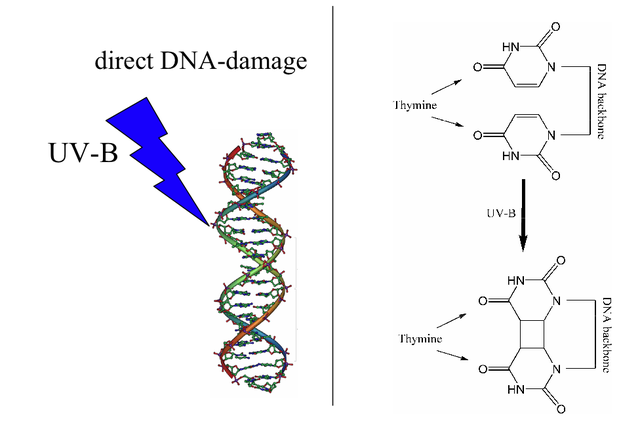热门问题
时间线
聊天
视角
光裂合酶
来自维基百科,自由的百科全书
Remove ads
光裂合酶(Photolyases,EC 4.1.99.3)为一种DNA修复酵素,专门修复遭受紫外线破坏的DNA。此酵素的作用需要可见光协助活化[1]及DNA修复[2]。光裂合酶修复DNA的过程称为光学活作用(photoreactivation)。
由系统发生学来看,光裂合酶是一个相当古老的酵素,从细菌、真菌[3],到动物体内都有[4],且在植物体内尤为重要。人类等胎盘哺乳类体内则并无此酵素活性,而是使用另一种较无效率的核苷酸切除修复法来取代光裂合酶[5]。
DNA中相邻的胸腺嘧啶受到紫外线的照射时,会形成共价键,形成环丁烷桥,称为胸腺嘧啶二聚体。形成胸腺嘧啶二聚体的基因会导致基因在复制和转录时出现错误[6]。光裂合酶会接在DNA上,切除胸腺嘧啶二聚体,并修复回原本的样子。

光裂合酶为一种黄素蛋白,内含两个捕光性辅因子。所有的光裂合酶都含有FADH−,并可根据他的第二辅因子分为两类。第一类为叶酸性光裂合酶,其第二辅因子的成分为次甲基四氢叶酸蝶呤(Methenyltetrahydrofolate,MTHF),称。第二类则为脱氮黄素性光裂合酶,其第二辅因子为8-羟-7,8-二甲基-5-脱氮核黄素(8-hydroxy-7,8-didemethyl-5-deazariboflavin,8-HDF)。FAD本身即有酵素活性,第二辅因子则可在低光状态下加速反应进行。被光活化的光裂合酶会将FADH−的电子,转移给胸腺嘧啶二聚体来裂解二聚体[7]。
除了第二辅因子之外,光裂合酶也可根据序列相似性分为两种,第一种主要在革兰氏阴性菌、阳性菌、嗜盐古菌、真菌,和植物体内。Proteins containing this domain also include Arabidopsis thaliana cryptochromes 1 and 2, which are blue light photoreceptors that mediate blue light-induced gene expression and modulation of circadian rhythms.
、可以将光裂合酶分为两类。The first class contains enzymes from Gram-negative and Gram-positive bacteria, the halophilic archaebacteria Halobacterium halobium,以及真菌与植物。阿拉伯芥的Cryptochrome 1与2亦含有此种结构域,作为促进蓝光基因表现与调整昼夜节律的光受体。
The second class are named cryptochrome (Cry), found in species as diverse as Drosophila, Arabidopsis, Synechocystis, and Human (Cry-DASH). These were previously assumed to have no DNA repair activity because of negligible activity on double-stranded DNA. A study[4] by A. Sancar and P. Selby provided evidence to suggest this branch of cryptochromes have photolyase activity with a high degree of specificity for cyclobutane pyrimidine dimers in single-stranded DNA. Their study showed that VcCry1 from Vibrio cholerae, X1Cry from Xenopus laevis, and AtCry3 from Arabidopsis thaliana all had photolyase activity on UV irradiated ssDNA in vitro.
Remove ads
人类体内含光裂合酶之蛋白
- CRY1
- CRY2
参考文献
外部链接
Wikiwand - on
Seamless Wikipedia browsing. On steroids.
Remove ads

